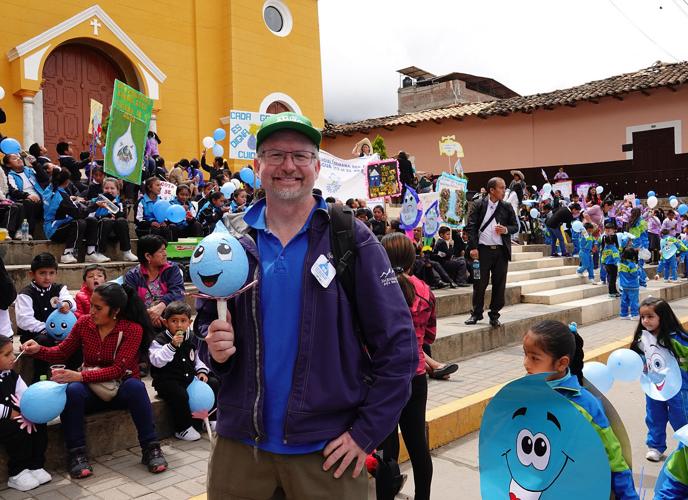Up until this month, Steve Vanderleest was reveling in his experience in the Peace Corps, helping people in the high-country town of Cajabamba, in Peru, and taking in the Peruvian scenery and culture.
All of that changed this month thanks to the COVID-19 crisis. Before he knew it, he found himself in Grand Junction, where he’s been spending two weeks in self-quarantine, as part of the first- ever total evacuation by the Peace Corps of all its volunteers around the world. More than 7,000 volunteers were brought home.
Vanderleest never even got to say farewell to the many he’d come to know in Cajabamba.
“It all happened pretty fast,” Vanderleest said of his evacuation.
“… I happened to be in Lima for some meetings in the capital in Peru when the word came down that we were all going to be sent home.”
Transportation was generally shut down in the country because of the COVID-19 outbreak, and its borders were closed. Vanderleest, a professional photographer who has delighted in capturing images of his time in Peru, said a fellow volunteer was able to grab Vanderleest’s hard drive with all of his photos on it and get it to him in Lima. His clothing, a camera and other belongings remain in Cajabamba, but he said he’s not worried about them.
He has hopes of returning there within six months, to be able to serve the one-year extension to his two-year assignment that he had obtained, and then say a proper goodbye to the people of Cajabamba and Peru.
“But of course that’s all up in the air right now,” he said.
FROM CITY ENGINEER TO VOLUNTEER
Vanderleest took a circuitous path to the Peace Corps and Peru, and to what he hopes will be only a temporary stay in Grand Junction before his return. He’s from Colorado Springs and studied civil engineering at Colorado State University. He worked for about two decades for the city of Glenwood Springs, where he was assistant city engineer when he left, and joined the Peace Corps in 2018.
The town he was assigned to serve in resembles the city he left behind in a lot of respects. Cajabamba has about 9,000 residents, along with hot springs, waterfalls and high-elevation lakes, sitting about 8,500 feet in elevation. Vanderleest got his wish not to be sent to a place in the jungle with heat and humidity.
He lived with a host family and worked on local, rural water systems, dealing with things such as maintenance and chlorination. He also focused on hygiene education, covering subjects such as proper water storage and basic handwashing. Vanderleest said handwashing “wasn’t a thing” where he was volunteering, but the emergence of COVID-19 has heightened awareness of the practice there.
“People are really paying attention to it now,” he said.
ABRUPT EXIT
Vanderleest said that in the past the Peace Corps sometimes has had to evacuate volunteers from individual countries, such as from Peru a few years ago because of flooding. He ended up being a part of something much greater in scale.
After Peru closed its borders, Vanderleest and his fellow volunteers who happened to be in Lima quarantined for a week at a hotel there. The Peace Corps was able to send a convoy of pickups to evacuate some volunteers from their posts around the country, and to hire a bus to retrieve others. Then the U.S. Embassy chartered a plane, and Peace Corps volunteers and some others were flown to the United States, Vanderleest said.
Vanderleest still owns a home in Glenwood Springs, but it’s rented out. Grand Junction is listed as his home of record because it’s where his sister, Judy Vanderleest, and her husband, Andy Kelley, live.
The Peace Corps flew everyone back to their homes of record, asking them to self-quarantine. But for Vanderleest, doing that at his sister’s wasn’t an option.
Judy Vanderleest, a retired court administrator, is undergoing cancer treatment and has a compromised immune system, so Steve Vanderleest ended up in an Airbnb rental for his self-quarantine.
While in self-quarantine around the country, returned Peace Corps volunteers have had a lot of time to consider what their futures hold, and what financial situation they may be left in as a result of their abrupt departures from their posts.
Vanderleest said that generally, when the Peace Corps evacuates a country or two, it flies volunteers home and gives them per-diem pay of about $40 a day for 45 days, while reassessing whether they can return.
“In this case, they decided just to close everyone’s service,” he said.
That means they are considered returned volunteers, no longer in active service, so no per-diem is provided. Vanderleest said he’ll need to reapply for his one-year extension in Peru.
UNCERTAIN FUTURES
He said the Peace Corps is reimbursing the cost for anyone who is self-quarantining in a hotel or Airbnb if someone living at their home of record has a high health risk. People who leave the Peace Corps also get a month of government health insurance, and the Peace Corps is providing an additional month of insurance before returned volunteers will need to find their own coverage.
Peace Corps volunteers receive money for room and board during their service. Afterward, they get a readjustment allowance based on $375 a month earned for 24 or fewer months of service, or $475 a month for service longer than that.
According to the Peace Corps website, it also pays an evacuation allowance intended to replace the readjustment allowance a volunteer would have earned over the next 12 months. As volunteers, people who served in the Peace Corps aren’t eligible for unemployment benefits.
According to the National Peace Corps Association, the $2.2 trillion COVID-19 financial package signed by President Donald Trump includes $88 million to assist the Peace Corps in the cost of evacuating its volunteers and to support initial transition assistance.
Vanderleest, 48, worries for younger returned volunteers who may not be in the best financial situation.
“Of course, the job situation is not looking good at the moment,” he said.
He said returned Peace Corps volunteers receive noncompetitive eligibility status when applying for federal jobs, something that’s good for a year.
That gives them a leg up in vying for those jobs, and Vanderleest said the Peace Corps has announced the status will apply to all volunteers who returned, whereas previously they had to have served for at least a year.
The Peace Corps says it also will let people apply to return to their country of service over the next year if the COVID-19 threat subsides, though reinstatement isn’t guaranteed. They also can re-enroll for another 27-month term of service in their country of service or another country, with expedited processing of the application but no guarantee of approval.
‘AN UNPRECEDENTED SITUATION’
Vanderleest said he thinks the Peace Corps is handling the situation as well as it could.
“It’s an unprecedented situation and the logistics of quickly returning over 7,000 volunteers back to the States and getting them back to their home of record is pretty amazing. There were just a few hiccups I heard about but nothing major,” he said.
In deciding to suspend volunteer activities, the Peace Corps cited not just COVID-19 itself but the travel constraints the crisis created. It worried that volunteers could end up stranded overseas as borders and air travel shut down to prevent the spread of the disease.
For Vanderleest, the situation leaves him worried about the future of the Peace Corps.
“My fear is now would be a perfect time to defund Peace Corps and to cease its existence. Now that all volunteers are pulled back, it would be an ideal time to cut Peace Corps. There have been some people advocating for that,” Vanderleest said.
In a message from Peace Corps Director Jody Olsen on the organization’s website, she described the suspension as temporary and looked to the organization’s future with optimism.
“To be clear, the Peace Corps is not closing posts, and Volunteers will be able to return to normal activities as soon as conditions permit. We are already planning for that day,” she wrote.
Vanderleest, who plans to remain in Grand Junction for now while he waits for his possible Peace Corps extension, would love to have the opportunity to spend one more year in Cajabamba.
“The work was rewarding, and the people are very friendly.”
“The naturaleza,” he said, slipping into Spanish for a second before translating, “the nature, the landscapes are beautiful, and the customs and fabrics and colors. Being a photographer, that was just an amazing experience.”


















